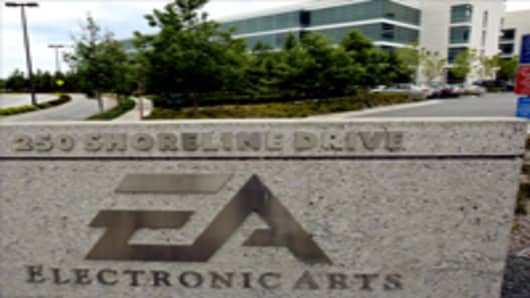Electronic Arts hasn’t exactly been a darling of Wall Street in recent years.
Battered by a string of earnings disappointments and underperfoming titles, the video game publisher has seen its archrival Activision-Blizzard take away king-of-the hill status among industry peers, and watched its stock price fall. But Frank Gibeau, the president of the EA Games label, says the company has made the necessary changes to get back on top.
“I really feel good about where we are at EA these days,” says Gibeau. “There’s a lot of transition going on in this industry and we’re really well positioned for that. …We feel like we’re on the offensive. We’re moving from a fire-and-forget packaged goods model to an online services model.”
Video games are certainly in a transition mode these days. The rise of mobile gaming, particularly on devices like the Apple iPhone and iPad, and social network gaming on sites such as Facebook, have hit some publishers hard as they have remained laser-focused on traditional console and game machines.
"Our earnings are up. We’re on our way back. … If we hadn’t made the changes we did, if we had just kept iterating game after game, we would be irrelevant and in far worse shape than we are now."
EA has been expanding its interests, though. In 2009, the company acquired social game developer Playfish. It has dramatically expanded its mobile division, enjoying a string of critical (and sales) successes. And it is experimenting more with free-to-play games that generate revenue through micro-transactions, small in-game purchases that generally range $5 or less.
It has also been spreading its releases across multiple platforms simultaneously. The retail release of “Dead Space 2,” for instance, was backed by an iPhone and iPad app. Gibeau says the strategy has not only exposed a new customer base to the game, but has had some surprising positive effects with the company’s core customers.
“What we’re finding is our customers are consuming our IPs [intellectual properties] across multiple devices,” he says. “What we’ve been orienting our company towards is creating IP universes that can exist across those platforms.”
It’s encouraging news, but it hasn’t really caused a spike so far in EA’s stock. Gibeau, though, says he expects that to turn around — and if the company had not taken these steps, the price per share would likely be a lot lower.
“We will get the stock price back,” he says. “Our earnings are up. We’re on our way back. …If we hadn’t made the changes we did, if we had just kept iterating game after game, we would be irrelevant and in far worse shape than we are now.”
Between EA's social network games and the upcoming “Star Wars” massively multiplayer online title it’s working on, the company is betting heavily on the PC as a gaming platform. Analysts, such as John Taylor of Arcadia Research, say that’s a sound strategy, as the platform reaches both the casual and core audience.
“The user base is gigantic,” notes Gibeau. “PC is the platform for Facebook. …PC retail (game sales are) a big problem, but PC download (sales) are awesome.”
As it continues to explore new outlets, Gibeau says EA is also looking at the connected TV audience, given that most TV manufacturers announced plans to add app stores to their sets beginning with this year’s models.
And while they’re still several years away, the next generation of console systems is something that’s already on the mind of the industry. And the biggest part of that game is figuring out what Microsoft, Sony and Nintendo are planning to do to make their new machines stand out from the current batch.
“What’s interesting is the displays are maxed out already,” he notes. “Once you get to 1080p [pixels], it’s not about increasing resolution. Obviously, more computing horsepower is nice, but to be honest, the Xbox 360 and PS3 still have a lot of horsepower that hasn’t been tapped. I really think the next innovation is in the input device, but even more importantly, what will the online experience be like?”
- Get real-time quotes for Electronic Arts here.


